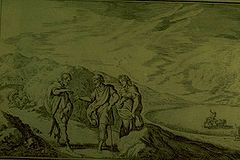- Mestra
-
 Erysichthon sells his daughter Mestra. An engraving from among Johann Wilhelm Baur's illustrations of Ovid's Metamorphoses. Poseidon can be seen in the lower-left background.
Erysichthon sells his daughter Mestra. An engraving from among Johann Wilhelm Baur's illustrations of Ovid's Metamorphoses. Poseidon can be seen in the lower-left background.
In Greek mythology, Mestra (Ancient Greek: Μήστρα, Mēstra)[nb 1] was a daughter of Erysichthon, King of Thessaly.[1] She had the ability to change her shape at will, a gift of her lover Poseidon according to Ovid.[2] Her father exploited this gift in order to sate the insatiable hunger with which he had been cursed by Demeter for violating a grove sacred to the goddess.[3] Erysichthon would repeatedly sell Mestra to suitors for the bride-prices they would pay, only to have the girl return home to her father in the form of various animals.[4]
Notes
- ^ She is also occasionally referred to as Mnestra in modern sources, though the form is not anciently attested; cf. Clytemnestra, whose name does appear with and without the n in ancient authors. The pseudo-Apollodoran Bibliotheca (2.1.5) uses the form Mnestra for one of Danaus' daughters who marries and then murders Aegius, son of Aegyptus.
References
- ^ Ovid, Metamorphoses 8.739; cf. Catalogue of Women fr. 43a.
- ^ Ovid, Met. 8.850–54.
- ^ Ovid, Met. 8.741–842; cf. Callimachus, Hymn to Demeter 24–69.
- ^ Hesiod, Cat. fr. 43a; Ovid, Met. 8.871–74.
Bibliography
- Fantham, E. (1993), "Sunt quibus in plures ius est transire figuras: Ovid's Self-Transformers in the Metamorphoses", CW 87: 21–36, JSTOR 4351453.
- Hopkinson, N. (1984), Callimachus: Hymn to Demeter, Cambridge, ISBN 978-0521604369.
- Ormand, K. (2004), "Marriage, Identity, and the Tale of Mestra in the Hesiodic Catalogue of Women", AJPh 125: 303–38, JSTOR 1562169.
- Robertson, N. (1983), "Greek Ritual Begging in Aid of Women's Fertility and Childbirth", TAPA 113: 143–69, JSTOR 284008.
- Robertson, N. (1984), "The Ritual Background of the Erysichthon Story", AJPh 105: 369–408, JSTOR 294833.
Categories:- Greek mythology
- Metamorphoses in Greek mythology
- Women in Greek mythology
- Greek mythology stubs
Wikimedia Foundation. 2010.
